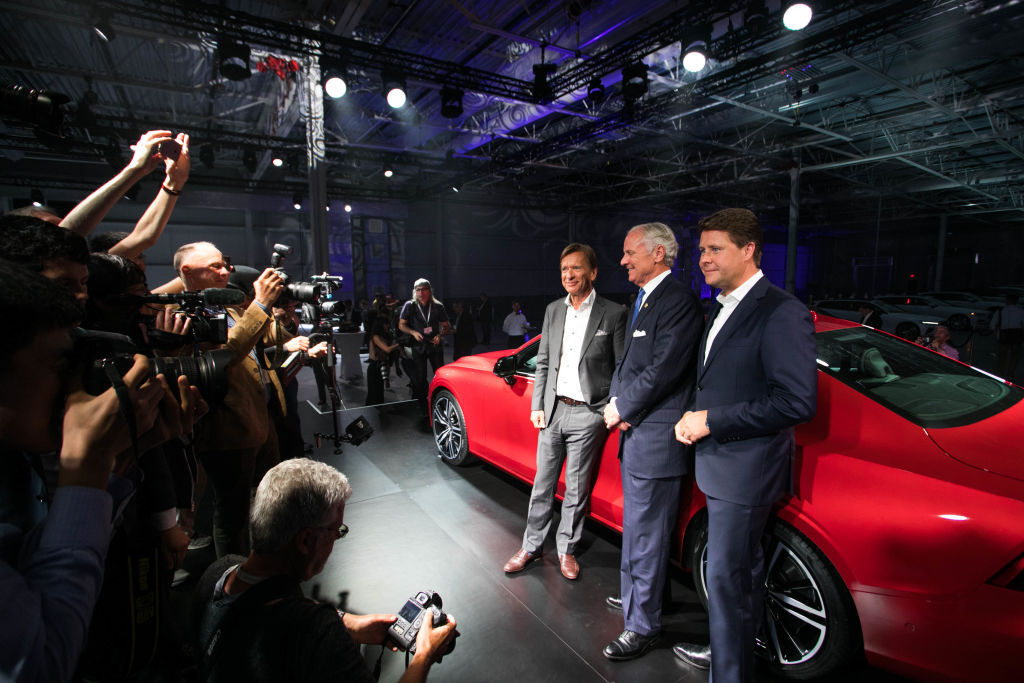

We may earn revenue from the products available on this page and participate in affiliate programs. Learn more ›
Volvo has built a massive new factory in the lowcountry outside Charleston, South Carolina. When it is fully ramped up sometime in early September, it will employ 4,000 people, and will be the primary assembler of the all-new S60 sedan, and later the next generation of the full-size XC90 SUV.
At the opening ceremony Wednesday, in a massive building a quick stroll away from the vehicle assembly buildings, former South Carolina Governor and current US Ambassador to the United Nations Nikky Haley joined current Governor Henry McMaster, Volvo CEO Hakan Samuelsson and the Swedish Ambassador Karin Olofsdotter.
Jobs, innovation, progress, shrimp cocktail. Impressive, NASA-proportioned buildings at the end of a street called Autonomous Road surrounded by thick stands of pine trees. There are alligators in a pond nearby. An international blend of dignitaries. Tiny pork biscuit sandwiches and Arnold Palmers served by attractive people holding trays. An elegant new Volvo sedan, the latest in a one-two-three-four punch of great new cars from the Sino-Swedish powerhouse. What could possibly go wrong?
Things started to get weird when the Swedish Ambassador took the stage. “This is an exceptional moment for South Carolina and for Volvo,” she said. “This is part of 386,000 people employed by Volvo in the United States.” Olofsdotter pointed out that Volvo is the 15th largest investor in the United States, then glanced at Nikki Haley, a Trump appointee. “But we are worried about real issues,” she added with a smile. “The aluminum and steel tariffs, obviously. But we are extremely worried about car tariffs.”
Haley’s smile froze on her face.

Olofsdotter is, of course, referring to the 25% and 10% taxes that Trump has imposed on steel and aluminum, respectively, imported from the European Union, Mexico, and Canada. Sweden is a member of the EU.
Then there’s the looming threat that Trump will impetuously impose a 25% tariff on imported cars—a devastating and destabilizing move for the global auto industry.
“This is like going back to the 19th century, with these tariffs,” said Samuelsson, after the unveiling of the new S60, during which a succession of new Volvo US employees stepped forward to testify to how grateful they are to be working at this impressive new facility. “I think that the US administration needs to take a deep breath and sit down and think this through.”
The timing of the plant opening is propitious. Donald Trump has already imposed a massive tariff on steel and aluminum—two of the main ingredients to manufacturing automobiles. Now he is inching toward a 25% tariff on all imported cars, a barrier that would be catastrophic for the global automotive industry, as well as the consumer.
“This is just disturbing,” Samuelsson said. “This escalation is bad. If there are going to be changes to tariffs they should be brought down to zero. If we don’t do this, and the tariffs continue or even escalate, then the consumers will have to pay for them. That is how tariffs would. The extra cost will be paid by the consumer.”
After the unveiling of the car, Haley bolted for the door, but the Ambassador wasn’t done. “We are making bonds weaker not stronger,” Olofsdottir told me afterwards. “We should sit down with Mr. Trump and his team and talk about this. We are totally against all tariffs. We should have open trade borders. That would be beneficial for everyone.
The Volvo CEO made perhaps the most impactful point. “I’m so disturbed by this,” he said. “We don’t need these threats or this escalation of tariffs. The truth of the matter is that if there are going to be changes to tariffs they should be brought down to zero. Otherwise, the consumers will have to pay for these tariffs. The extra cost will be paid for by the consumer. I hope we can take a deep breath.”

